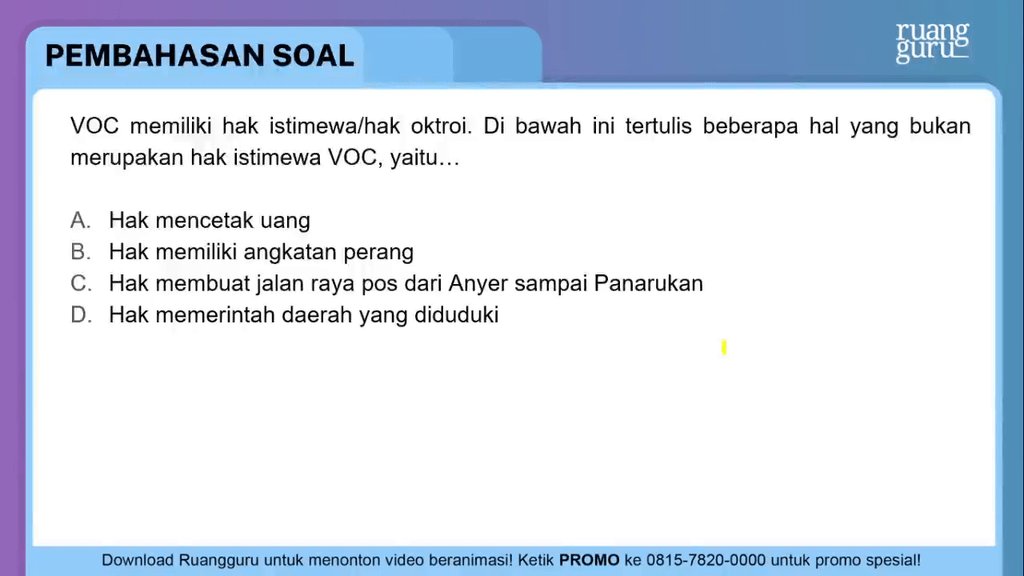
The privileges of the Dutch East India Company, or VOC, were extensive, but not without limits. It’s essential to clarify that berikut ini yang tidak termasuk hak istimewa bagi voc adalah kontrol penuh atas semua perdagangan di Indonesia. The VOC operated with significant powers, including tax exemptions and the right to wage war, but some areas remained outside their grasp.
Understanding these limitations helps us appreciate the historical context of European colonialism in Indonesia. By recognizing what the VOC could not do, we gain a clearer view of its impact on the region. Let’s delve into the specific privileges and restrictions that shaped the company’s legacy.
Berikut Ini yang Tidak Termasuk Hak Istimewa bagi VOC Adalah…
The Dutch East India Company, or VOC (Vereenigde Oostindische Compagnie), played a significant role in global trade during the 17th and 18th centuries. It was established to enhance Dutch trade interests in the East Indies. The company acquired various privileges and rights that allowed it to dominate trade in Southeast Asia. However, not everything was within their realm of privileges. This article dives into the intricate world of VOC’s rights and privileges and specifically focuses on those that did not belong to them.
The Foundation of VOC Rights and Privileges
Understanding what VOC was not privileged to requires an overview of what they actually held. The VOC was granted numerous rights by the Dutch government, enabling it to operate effectively in Southeast Asia.
- Trade monopolies over specific regions and commodities.
- Power to establish colonies and military facilities.
- Ability to enter treaties and alliances with local rulers.
- Control over local trade to ensure profit for the Netherlands.
Yet, despite these extensive privileges, there were significant limitations and rights that VOC did not possess.
Key Limitations of VOC’s Privileges
While the VOC enjoyed many powers, several critical rights were outside their reach:
Authority Over Domestic Politics in the Netherlands
The VOC operated primarily as a commercial entity. Its interests were aligned with trade rather than political governance. Therefore, they did not have any authority over domestic political matters in the Netherlands. The company’s decisions could influence politics, but they couldn’t directly control the Dutch government or political processes.
Jurisdiction over Justice Systems in the Netherlands
The VOC had no jurisdiction over the Dutch legal system. Although they established courts in their colonies, any legal matters concerning their operations back home remained under the authority of the Dutch legal system. This separation of powers meant that any criminal or civil cases involving VOC members were dealt with under Dutch law.
Control Over the Entire Scope of the Colonies
While the VOC controlled several territories in Southeast Asia, it did not have the authority over all colonies. Other European powers, including the British, Portuguese, and Spanish, possessed territories and trade interests. The VOC could not lay claim to these areas, limiting their reach and influence.
Rights to Absolve Colonial Mismanagement
Mismanagement and corruption occasionally plagued the VOC, but they lacked the right to unilaterally absolve these issues without oversight. The Dutch government maintained authority over major decisions, especially when it came to reports and investigations about mismanagement.
Understanding the Economic Restrictions
The VOC had immense economic power, yet certain economic rights remained off-limits.
Setting Tax Rates Independently
The VOC could not independently set tax rates on goods or services. Instead, they were subject to the taxation policies established by the Dutch government. This arrangement meant that any profits made were influenced by external tax structures, impacting overall earnings.
Trade Exclusivity in All Asian Regions
Though the VOC operated in numerous regions, they did not hold exclusivity in all Asian trade. Other companies could engage in commerce within the same markets. This meant that competition existed, directly affecting the VOC’s profitability and market control.
Monopoly Over Raw Materials
The VOC dominated many trade routes, but they did not have full control over all raw materials. Local rulers often retained some control over resources and could negotiate independently, which sometimes undercut VOC’s pricing strategies and supply chains.
Diplomatic Limitations
The VOC had some privileges related to diplomacy, but they faced restrictions too.
Forming Alliances Without Consent
The VOC could negotiate treaties with local rulers, but they could not form alliances without the consent of the Dutch government. All significant diplomatic moves had to align with Dutch foreign policy, limiting the autonomy of VOC’s diplomatic actions.
Exclusivity on Diplomatic Recognition
While the VOC represented the Dutch government in foreign lands, they could not unilaterally grant diplomatic recognition to other entities or nations. Such decisions required approval from the Dutch authorities, which restricted the VOC’s influence and operations.
Social and Cultural Restrictions
Beyond economic and political limitations, social and cultural aspects also defined the boundaries of VOC’s privileges.
Imposing Cultural Norms
The VOC had limited ability to impose Dutch cultural norms on local populations. While they attempted to spread Christianity and European customs, local cultures were resilient and largely maintained their traditions. This limitation demonstrated the strength of indigenous cultures against colonial pressures.
Control over Indigenous Labor Practices
Although the VOC utilized local labor forces, they did not have the authority to dictate all aspects of labor practices. Labor conditions remained influenced by local customs and systems, which sometimes clashed with VOC’s demands and expectations.
The Decline of VOC’s Authority
As time passed, the limitations of the VOC became more pronounced, leading to a decline in its influence and power.
Failure to Adapt to Changing Markets
The VOC struggled to adapt to the rapidly changing global market. As other nations entered the trade sphere, their monopolistic power waned. They could not prevent the influx of competitors, which led to diminishing returns and eventually financial difficulties.
Corruption and Mismanagement
Internal corruption and mismanagement escalated within the VOC, which directly impacted their ability to respond to external pressures. The lack of a reliable oversight mechanism from the Dutch government meant that issues sometimes spiraled out of control, causing a loss of trust and authority.
The Final Dissolution
By the late 18th century, the VOC’s inability to manage its privileges and responsibilities led to its dissolution in 1799. The Dutch government took over its assets, marking the end of an era defined by VOC’s expansive but limited authority.
In summary, the VOC was a powerful entity with many privileges, but it also faced significant limitations that defined its role and impact in global trading. Understanding what privileges the VOC did not possess provides better insight into the complexities of colonialism and trade during that time. Their journey illustrates how power can be constrained by various factors, including politics, economics, and cultural resistance. By examining these aspects, we appreciate the intricate web of interactions that shaped the historical landscape of trade in Southeast Asia.
KEKUASAAN VOC DI INDONESIA
Frequently Asked Questions
“`html
What were the primary privileges granted to the VOC?
The VOC, or the United East India Company, received several privileges that included the right to conduct trade, establish settlements, negotiate treaties, and maintain a military presence for protection. These rights allowed the VOC to dominate trade in the regions where it operated, particularly in the spice trade in Southeast Asia.
How did the VOC influence trade in the East Indies?
The VOC significantly impacted trade in the East Indies by monopolizing the spice trade and leveraging its trading posts to establish a network that controlled supply and pricing. The company utilized its privileges to eliminate competition and expand its territory, which allowed it to dictate terms to local producers and consumers.
What role did the Dutch government play in the establishment of the VOC?
The Dutch government provided initial support for the VOC by granting it a charter that allowed the company to operate as a state-backed monopoly. This charter gave the VOC the authority to exercise powers typically reserved for the government, such as waging war and negotiating treaties, contributing to its power and influence in international trade.
Did the VOC face any significant challenges during its operation?
Yes, the VOC faced numerous challenges, including competition from other European powers, local resistance in the regions where it operated, and internal financial mismanagement. These challenges often impacted its ability to maintain its monopoly and profitability in trade.
What led to the eventual decline of the VOC?
The decline of the VOC stemmed from a combination of factors, including overextension of its resources, corruption, and financial mismanagement. Additionally, competition from other European traders and changing economic conditions also contributed to the company’s weakening position, leading to its dissolution in the late 18th century.
“`
Final Thoughts
Berikut ini yang tidak termasuk hak istimewa bagi VOC adalah kewenangan untuk mengatur semua urusan perdagangan di wilayah Nusantara. Hak ini tetap berada di tangan pemerintah lokal dan masyarakat setempat.
VOC juga tidak memiliki hak untuk mendirikan lembaga peradilan yang mengadili seluruh penduduk. Itu adalah tanggung jawab pemerintah yang ada di daerah tersebut.
Penting untuk memahami bahwa VOC menjalankan banyak hak istimewa, namun terdapat batasan yang jelas. Dengan demikian, kita dapat melihat bagaimana keberadaan VOC dipengaruhi oleh struktur kekuasaan yang ada pada masa itu.




